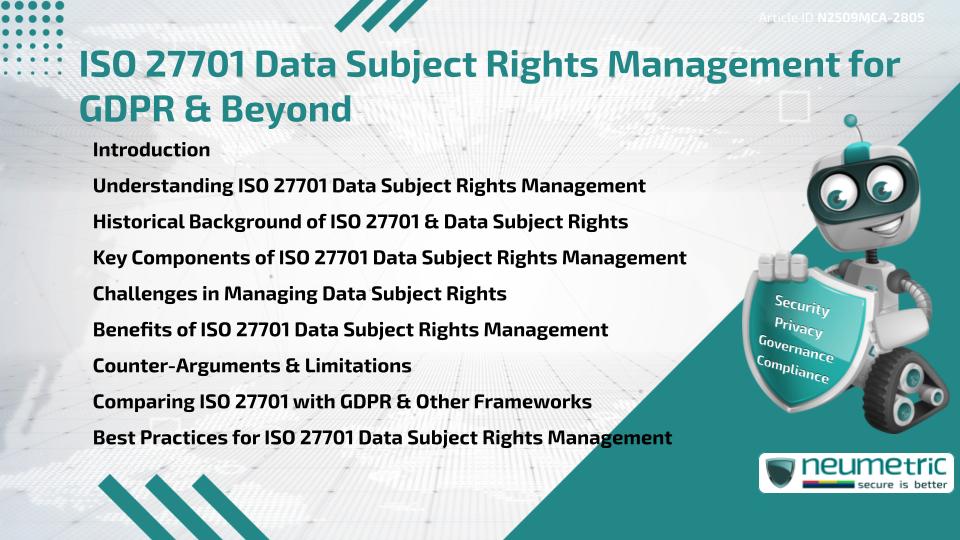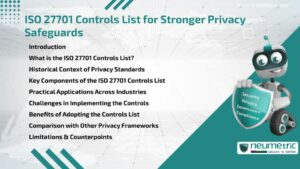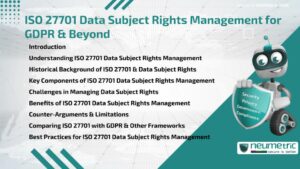Table of Contents
ToggleIntroduction
The ISO 27701 Data Subject Rights Management Framework provides Organisations with structured methods to manage requests from individuals regarding their Personal Data. These Rights-such as access, rectification, erasure & portability-are central to the General Data Protection Regulation [GDPR] and other Privacy laws. By applying ISO 27701 Data Subject Rights Management, Organisations can ensure compliance, improve accountability & build trust with Stakeholders while preparing for global Privacy requirements beyond GDPR.
Understanding ISO 27701 Data Subject Rights Management
Iso 27701 Data Subject Rights Management refers to processes defined under ISO 27701, the extension of ISO 27001 for Privacy information Management. It guides Organisations in responding effectively to requests from Data Subjects, ensuring that Personal Data is handled lawfully, transparently & securely. This Management system integrates with the Information Security Management system [ISMS], providing a combined approach to security & Privacy compliance.
Historical Background of ISO 27701 & Data Subject Rights
ISO 27701 was published in 2019 to complement ISO 27001 & ISO 27002 by addressing Privacy-specific requirements. It aligns closely with GDPR, particularly its focus on Data Subject Rights. The Standard was designed in response to the growing global emphasis on individual Privacy, creating a Framework that Organisations can adopt to meet GDPR obligations & adapt to similar regulations such as Brazil’s LGPD & California’s CCPA.
Key Components of ISO 27701 Data Subject Rights Management
The ISO 27701 Data Subject Rights Management Framework includes several critical components:
- Request handling procedures: Establishing workflows for receiving & verifying Data Subject requests.
- Access Rights: Providing individuals with access to their Personal Data upon request.
- Rectification & erasure: Allowing individuals to correct inaccuracies or request deletion of their data.
- Data portability: Enabling individuals to transfer their data to another provider.
- Objection & restriction: Managing cases where individuals object to processing or request limitations.
- Transparency: Ensuring clear communication with individuals about how their data is used.
- Audit & documentation: Recording how requests are managed to demonstrate accountability.
Challenges in Managing Data Subject Rights
Organisations face several challenges in implementing ISO 27701 Data Subject Rights Management:
- High volumes of requests that can strain resources.
- Difficulty verifying the identity of requesters without exposing additional data.
- Integrating Rights Management processes into existing systems.
- Coordinating responses across departments & third parties.
- Meeting strict timelines, such as GDPR’s one (1)-month response deadline.
Benefits of ISO 27701 Data Subject Rights Management
Despite challenges, iso 27701 Data Subject Rights Management offers significant benefits:
- Ensures compliance with GDPR & similar Privacy laws.
- Builds trust by demonstrating Transparency & Accountability.
- Enhances efficiency with standardised request-handling procedures.
- Provides clear documentation to support audits & regulatory inquiries.
- Strengthens global readiness for emerging Privacy frameworks.
Counter-Arguments & Limitations
Some argue that implementing a formal Framework for Data Subject Rights Management is resource-intensive, especially for small Organisations. Others highlight that compliance does not eliminate Risks of data misuse or breaches. While these points are valid, iso 27701 Data Subject Rights Management provides a scalable & proactive approach that reduces overall Risks & improves resilience.
Comparing ISO 27701 with GDPR & Other Frameworks
GDPR defines the legal requirements for Data Subject Rights, while ISO 27701 provides a structured, certifiable Management Framework to operationalize them. Compared with other frameworks like CCPA or LGPD, iso 27701 offers a broader, globally recognized Standard that Organisations can use to harmonize Privacy practices across jurisdictions.
Best Practices for ISO 27701 Data Subject Rights Management
Organisations can maximize effectiveness by:
- Establishing clear request-handling workflows.
- Using secure portals or systems for Data Subject communication.
- Training staff to recognize & manage Data Subject requests.
- Automating request tracking to ensure timely responses.
- Regularly reviewing Policies & procedures to adapt to regulatory changes.
Conclusion
The ISO 27701 Data Subject Rights Management Framework equips Organisations with structured tools to handle Privacy Rights effectively. By embedding these processes into their ISMS, businesses can comply with GDPR, prepare for other global Privacy laws & foster stronger trust with individuals.
Takeaways
- Iso 27701 Data Subject Rights Management ensures Organisations address Privacy Rights systematically.
- Key components include request handling, rectification, portability & transparency.
- Challenges include high request volumes, verification & strict deadlines.
- Benefits include compliance, trust & global readiness.
FAQ
What is ISO 27701 Data Subject Rights Management?
It is the Framework under ISO 27701 for managing requests from individuals about their Personal Data.
How does it relate to GDPR?
It operationalizes GDPR’s requirements for Rights such as access, erasure & portability.
What challenges do Organisations face?
Challenges include handling large volumes of requests, verifying identities & meeting deadlines.
What benefits does ISO 27701 provide?
It ensures compliance, improves efficiency, builds trust & prepares Organisations for global Privacy laws.
How does ISO 27701 compare with GDPR alone?
GDPR defines the Rights, while ISO 27701 provides a certifiable Framework to manage them.
Can small Organisations use ISO 27701 Data Subject Rights Management?
Yes, the Framework is scalable & can be adapted to smaller firms.
References
- ISO – ISO/IEC 27701 Privacy Information Management
- European Commission – GDPR Rights for Citizens
- CNIL – Rights of Individuals
- Council of Europe – Data Protection and Privacy
Need help for Security, Privacy, Governance & VAPT?
Neumetric provides organisations the necessary help to achieve their Cybersecurity, Compliance, Governance, Privacy, Certifications & Pentesting needs.
Organisations & Businesses, specifically those which provide SaaS & AI Solutions in the Fintech, BFSI & other regulated sectors, usually need a Cybersecurity Partner for meeting & maintaining the ongoing Security & Privacy needs & requirements of their Enterprise Clients & Privacy conscious Customers.
SOC 2, ISO 27001, ISO 42001, NIST, HIPAA, HECVAT, EU GDPR are some of the Frameworks that are served by Fusion – a SaaS, multimodular, multitenant, centralised, automated, Cybersecurity & Compliance Management system.
Neumetric also provides Expert Services for technical security which covers VAPT for Web Applications, APIs, iOS & Android Mobile Apps, Security Testing for AWS & other Cloud Environments & Cloud Infrastructure & other similar scopes.
Reach out to us by Email or filling out the Contact Form…





